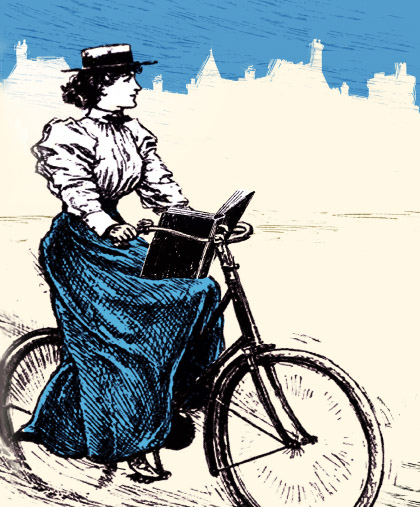Malala Yousafzai’s courageous fight for the right to go to school has highlighted that there are places in the world where any attempt to educate girls is met with fierce and often violent opposition. Jessica Swale’s timely play Blue Stockings reminds us that not so very long ago great hostility towards the education of females could be found right here. In the late 1800s Dr. Henry Maudsley had a high reputation as a pioneering, enlightened psychiatrist, yet he could assert with confidence that if a woman pursued an academic life the consequences were likely to be dire, for her mental efforts could ‘lead to atrophy, mania, or worse – leave her incapacitated as a mother’. Maudsley was no crackpot; such views were common currency.
Blue Stockings takes us back to Cambridge in 1896. Girton College has been the first to admit women students, but though they are permitted to study they are not necessarily welcome at lectures and they do not have the right to graduate. The college Principal Elizabeth Welsh is determined to gain this right for them, but she recognizes the need for quiet, cautious diplomacy. She is in an uneasy alliance with her colleague Miss Blake, who is not afraid to join forces with the more vociferous and confrontational suffragist movement.
The play follows four new Girton students through their first year. Tess Moffat, a talented astronomer, soon creates quite a stir when she has the temerity to openly challenge visiting lecturer Dr. Maudsley as expounds his theory that many female disorders are rooted in a fundamental moral weakness peculiar to women. Yet the first of the four students to really suffer from the full force of society’s opposition is not the outspoken and rebellious Tess but Maeve, a quieter and very clever working-class girl whose studies have been supported by a charitable benefactor. This comes to a sudden end when her brother comes to take her home; their mother has died and she must now care for her younger siblings. There is a double injustice here; she must lose her education not just because she is a woman, but also because she is poor. In Nicola Taggart’s moving performance we feel Maeve’s anguish as she realizes she must now abandon all hope of personal fulfillment.
Not every scene packs quite such emotional force. Florence Pettit’s set makes clever use of the familiar furniture of a place of education – blackboards, desks, library shelves etc. – and the cast skillfully rearrange these between each scene, but these are often quite brief, so there is frequent bustling about shifting desks and piles of books, and the narrative can at times lose some of its energy, particularly when the focus is upon the broader political picture rather than on the personal dilemmas faced by the individual Girton girls. The play is at its best when the politics and the personal collide. In a production full of excellent performances Georgia Kerr is superb as Tess, torn between her love of science and her new-found passion for Ralph, a student given to recitations of love poems in the orchard. Her struggle to reconcile the demands of her private life with those of her chosen profession depicts a dilemma that will surely be familiar to many women today.
The most shocking scene occurs when the girls are out buying material with which to make banners for their campaign for the right to graduate. They are confronted by some male students, one of whom launches into an extraordinary tirade full of misogynistic venom, delivered with great conviction by Craig Fuller in a speech that makes it very clear that behind all the patronising talk of the need to protect women from their own physical and mental frailties there could lurk real, unadorned hatred.
We know, of course, that they eventually triumphed in their battle to have the right to graduate, though you may be surprised to learn how very recently that victory came. Director Donnacadh O’Briain says, ‘The questions raised in the play are not merely historical curiosities.’ He is right. Blue Stockings is full of astonishing information about the prejudices women had to overcome in the past, but it also serves to remind us that inequalities remain. Go see it. You will be entertained – and educated! ★★★★☆ Mike Whitton


